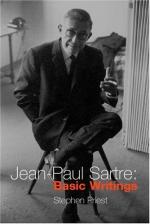|
This section contains 1,464 words (approx. 5 pages at 300 words per page) |

|
Sartre, in the tradition of phenomenology, distinguishes three related but quite different structures [of existential literature]: memory, anticipation, and imagination. Something remembered, something anticipated, and something imagined are not three variations on the same perceptual theme; they are radically different modes of awareness. When I remember, I recapture a state of affairs that is real in the mode of the past: what I remember happened, and it is that happening, now past, which I search for in memory. The past event is not an unreality but a reality whose mode of being is its being past…. "In order to imagine," Sartre writes, "consciousness must be free from all specific reality and this freedom must be able to define itself by a 'being-in-the-world' which is at once the constitution and the negation of the world; the concrete situation of the consciousness in the world must at each moment serve...
|
This section contains 1,464 words (approx. 5 pages at 300 words per page) |

|


